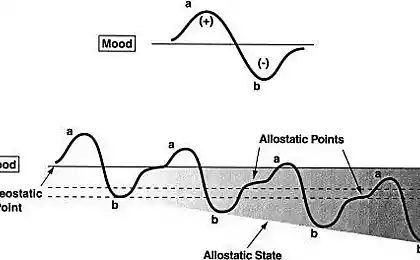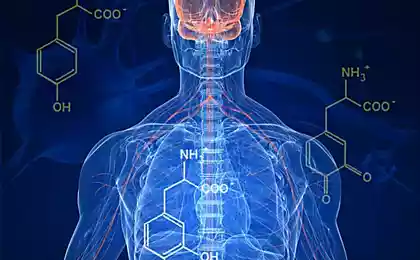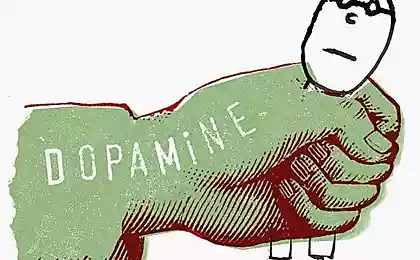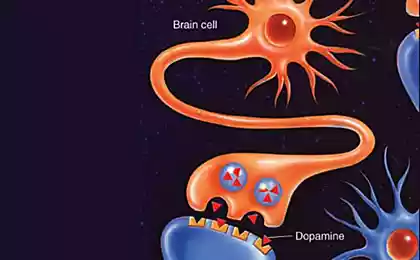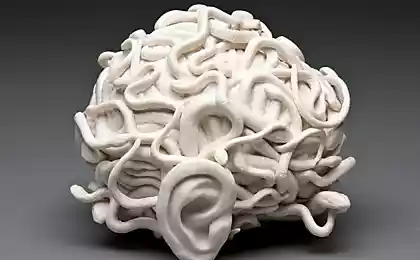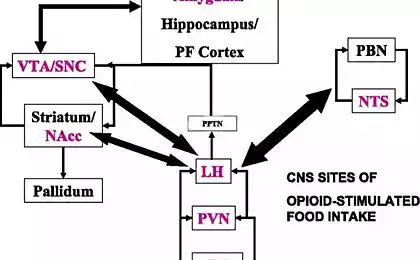687
Cut the Gordian knot of problems with sleep, from dopamine to leptin
Continues to talk about the importance of biological rhythms, that is very important to consider the time factor. Outside the context of the time talking about health it makes little sense. Prognosis and treatment - it is the base of your health skeleton.
According to the World Health Organization, 40% of the world population suffer from sleep disorders in one form or another. Lack of sleep leads to weight gain (obesity, blame the hormone leptin) and behavioral disorders (addiction and depression, blame dopamine) that occur in the lives of one in four people (or perhaps most).

1. Light and melatonin.
The more you sleep is shifted with respect to the light day, the more you are prone to obesity. In other words, the more time you spend under bright artificial light - the more fat you will be deferred in any visible places
. A man who goes to bed at 11 pm, will be significantly less likely to become fat than the one who lies down in the 12, although it would seem, an hour - a very small difference. This is due to the fact that artificial light is delayed production of melatonin, which in turn causes an increased production of the hormone ghrelin, which causes an excess of appetite and hunger. As a result, the person has the desire to "have a bite", even if the physiological need for it is not.
Usually this feeling arises immediately, spontaneously, in the late hours. However, even if the person does not feel it, or suppress all the same - the body "gets" the extra, unnecessary calories to him the next day
. 2. Leptin and ghrelin.
Jet lag enhance the feeling of hunger (ghrelin hormone) and decrease satiety (leptin). If a dream is not enough prolonged or substantial part of it will be held after sunrise, when the already light in the body will decrease the level of another hormone, leptin, which is a ghrelin antagonist. Lack of leptin lead to the fact that people will not experience a feeling of fullness even when it had eaten his fill.
To sleep it was long enough to sleep for "legal-eight hours." If sleep was shallow, restless, with broken phases, with snoring and other sleep apnea symptoms - it also will lead to a drop in leptin levels
. Therefore, you feel hungry all day and eat. Thus, 80 minutes of lack of sleep will make you eat additional 549 kcal per day. According to another study - 1 hour sleep deprivation - 200 kcal extra food.
Even with absolutely the same number of calories eaten, people sleeping 8, 5:00 to lose fat in half the time than people sleeping at 5, 5:00.
Five days of sleep deprivation significantly reduce sensitivity to insulin, which leads to the fact that actively starts to store fat, and where horrible.
3. The brown fat and fat burning.
It turned out one more important point, the temperature in the room where people sleep also affects the nature of metabolism. If the dream takes place in a cool place degrees (19-20), it causes the body's hormone irizina in whose presence instead of harmful "white" fat in the body formed a useful "brown" fat.
And what's more, if irizin circulates in the body for quite a long time starts the process of transition of white fat into brown. Which is not only useful, but also deposited in areas which do not spoil the figure (in the kidney area, shoulders, upper back), and substantially smaller amounts.
4. melatonin and dopamine.
Melatonin and dopamine have different rhythms, which work in opposition. Rhythm dopamine content is shifted in phase relative melatonin rhythm at 12 hours. There is evidence of an antagonistic interaction between melatonin and dopamine.
As you know, all the animals react to the change of light and dark time of the day, adjusting your sleep and diet. Thus mammal depending on the time of day and changing body temperature. Signals received by the retina, our body translates into a language understood by the rest of the system.
An important role in this process is just the pineal gland. It synthesizes melatonin is a hormone that is produced in an organism only at night. Melatonin helps regulate the body's metabolic activity during sleep. If this hormone is normal, then the problem of insomnia you most likely will not encounter. In addition, melatonin protects against stress and premature aging.
In regulating the synthesis of melatonin in the pineal gland is also involved hormone norepinephrine. The results of the research scientists have shown that norepinephrine receptors interact with the dopamine receptors, forming a "heteromer". During this interaction reduces the effect of noradrenaline, dopamine, which in turn leads to reduced production and that the release of melatonin.
Dopamine receptors as scientists were able to establish, in the pineal gland appear closer to the end of the night. Thus, the formation of "heteromer" - an effective mechanism for stopping production of melatonin with the beginning of the day and hence, brain awakening
. If you do not produce melatonin, then you there is an increased sensitivity to the pleasures of the evening, the so-called "night zhor».
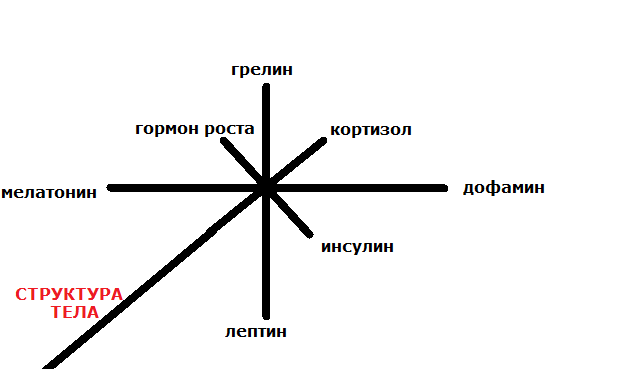
5. Why sweet tasty evening? (For people with shifted rhythms)
Insufficient levels of leptin, especially in the evening, causing increased sensitivity pleasure center in the brain to the neurotransmitters that cause feelings of happiness and satisfaction. As a result, dopamine, which normally only has to give a "sense of satisfaction saturation" instead begins to fill consciousness almost in waves of happiness from eating.
The sensitivity of pleasure center reaches a maximum in the late hours and people unconsciously defer going to bed, trying to extend the period of the "good mood". That in turn again causes ghrelin levels rise, falling leptin levels and getting much pleasure from eating.
Therefore, for a person with mild "pre-depression" any pleasure "delicious" in the evening, when the brain releases more dopamine. That's why you do not sleep - to get more dopamine
. Author: Andrew Beloveshkin
According to the World Health Organization, 40% of the world population suffer from sleep disorders in one form or another. Lack of sleep leads to weight gain (obesity, blame the hormone leptin) and behavioral disorders (addiction and depression, blame dopamine) that occur in the lives of one in four people (or perhaps most).

1. Light and melatonin.
The more you sleep is shifted with respect to the light day, the more you are prone to obesity. In other words, the more time you spend under bright artificial light - the more fat you will be deferred in any visible places
. A man who goes to bed at 11 pm, will be significantly less likely to become fat than the one who lies down in the 12, although it would seem, an hour - a very small difference. This is due to the fact that artificial light is delayed production of melatonin, which in turn causes an increased production of the hormone ghrelin, which causes an excess of appetite and hunger. As a result, the person has the desire to "have a bite", even if the physiological need for it is not.
Usually this feeling arises immediately, spontaneously, in the late hours. However, even if the person does not feel it, or suppress all the same - the body "gets" the extra, unnecessary calories to him the next day
. 2. Leptin and ghrelin.
Jet lag enhance the feeling of hunger (ghrelin hormone) and decrease satiety (leptin). If a dream is not enough prolonged or substantial part of it will be held after sunrise, when the already light in the body will decrease the level of another hormone, leptin, which is a ghrelin antagonist. Lack of leptin lead to the fact that people will not experience a feeling of fullness even when it had eaten his fill.
To sleep it was long enough to sleep for "legal-eight hours." If sleep was shallow, restless, with broken phases, with snoring and other sleep apnea symptoms - it also will lead to a drop in leptin levels
. Therefore, you feel hungry all day and eat. Thus, 80 minutes of lack of sleep will make you eat additional 549 kcal per day. According to another study - 1 hour sleep deprivation - 200 kcal extra food.
Even with absolutely the same number of calories eaten, people sleeping 8, 5:00 to lose fat in half the time than people sleeping at 5, 5:00.
Five days of sleep deprivation significantly reduce sensitivity to insulin, which leads to the fact that actively starts to store fat, and where horrible.
3. The brown fat and fat burning.
It turned out one more important point, the temperature in the room where people sleep also affects the nature of metabolism. If the dream takes place in a cool place degrees (19-20), it causes the body's hormone irizina in whose presence instead of harmful "white" fat in the body formed a useful "brown" fat.
And what's more, if irizin circulates in the body for quite a long time starts the process of transition of white fat into brown. Which is not only useful, but also deposited in areas which do not spoil the figure (in the kidney area, shoulders, upper back), and substantially smaller amounts.
4. melatonin and dopamine.
Melatonin and dopamine have different rhythms, which work in opposition. Rhythm dopamine content is shifted in phase relative melatonin rhythm at 12 hours. There is evidence of an antagonistic interaction between melatonin and dopamine.
As you know, all the animals react to the change of light and dark time of the day, adjusting your sleep and diet. Thus mammal depending on the time of day and changing body temperature. Signals received by the retina, our body translates into a language understood by the rest of the system.
An important role in this process is just the pineal gland. It synthesizes melatonin is a hormone that is produced in an organism only at night. Melatonin helps regulate the body's metabolic activity during sleep. If this hormone is normal, then the problem of insomnia you most likely will not encounter. In addition, melatonin protects against stress and premature aging.
In regulating the synthesis of melatonin in the pineal gland is also involved hormone norepinephrine. The results of the research scientists have shown that norepinephrine receptors interact with the dopamine receptors, forming a "heteromer". During this interaction reduces the effect of noradrenaline, dopamine, which in turn leads to reduced production and that the release of melatonin.
Dopamine receptors as scientists were able to establish, in the pineal gland appear closer to the end of the night. Thus, the formation of "heteromer" - an effective mechanism for stopping production of melatonin with the beginning of the day and hence, brain awakening
. If you do not produce melatonin, then you there is an increased sensitivity to the pleasures of the evening, the so-called "night zhor».

5. Why sweet tasty evening? (For people with shifted rhythms)
Insufficient levels of leptin, especially in the evening, causing increased sensitivity pleasure center in the brain to the neurotransmitters that cause feelings of happiness and satisfaction. As a result, dopamine, which normally only has to give a "sense of satisfaction saturation" instead begins to fill consciousness almost in waves of happiness from eating.
The sensitivity of pleasure center reaches a maximum in the late hours and people unconsciously defer going to bed, trying to extend the period of the "good mood". That in turn again causes ghrelin levels rise, falling leptin levels and getting much pleasure from eating.
Therefore, for a person with mild "pre-depression" any pleasure "delicious" in the evening, when the brain releases more dopamine. That's why you do not sleep - to get more dopamine
. Author: Andrew Beloveshkin
